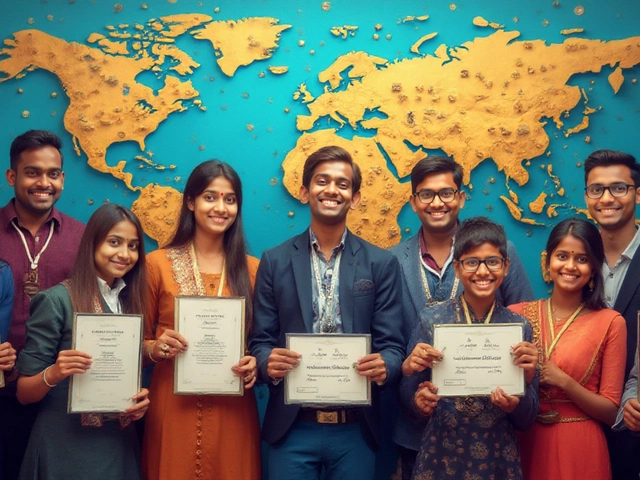In the world of qualifications, not all licenses are created equal. Some demand more than just knowledge; they require perseverance, grit, and an unwavering commitment to mastering their nuanced requirements.
Whether we're discussing piloting a commercial aircraft, practicing law across states, or navigating the financial seas as a certified accountant, each path presents unique hurdles. In this exploration, we'll dive into licenses renowned for their complexity and the diverse paths people take to earn them.
We'll uncover the secrets behind these challenging qualifications, providing insights and tips for those brave and ambitious enough to pursue them. Let's embark on this journey to understand what it truly takes to hold some of the world's toughest licenses.
- Understanding the Complexity of Licenses
- Top Difficult Licenses Worldwide
- Why These Licenses Are So Challenging
- The Preparation Required
- Tips for Aspiring License Holders
Understanding the Complexity of Licenses
In the realm of professional qualifications, some licenses are not just pieces of paper but are emblematic of a profound journey filled with rigorous challenges. These daunting paths often test the resilience, intellectual stamina, and dedication of candidates. To put it simply, the hardest licenses stand as formidable benchmarks of expertise, making them highly coveted but equally elusive. For instance, to become a board-certified neurosurgeon in the United States, an individual must navigate through extensive training. This includes completing four years of undergraduate studies, followed by another four years in medical school, and then an additional seven to eight years in a residency program. This arduous path is intended to ensure that these medical professionals are well-prepared for the real-life complexities of their field.
Moreover, certain sectors demand specialized licenses such as those in aviation. Aspiring commercial pilots face challenges that are both technical and psychological. From mastering dynamic weather patterns and complex navigational systems to maintaining composure under pressure, the hurdles are varied and often unexpected. It’s not merely about clocking flight hours; understanding aerodynamics and crisis management is key to successful flight operations. According to an interesting statistic, the Federal Aviation Administration requires candidates to accumulate at least 1,500 hours of flight experience before even attempting to secure their airline transport pilot license.
The legal profession also has its fair share of tough licenses. Bar exams are notoriously difficult, serving as a significant filter in the career path of aspiring lawyers. Hundreds of pages of legal texts and complex case laws must be thoroughly understood, a daunting feat for anyone, particularly when the pressure of time-bound exams is factored in. Harvard Law Review describes the bar exam as "a peculiar rite of passage with an intensity that leaves even the most stoic minds overwhelmed." Those contemplating this career often embark on months of tireless study efforts, seeking mastery over the intricate legal concepts tested.
Other areas like finance also hold their own in terms of complexity. The Chartered Financial Analyst (CFA) designation, often referred to as the gold standard in finance and investment, demands a deep understanding of investment analysis, economics, and portfolio management. Candidates must pass a series of challenging exams that historically have low pass rates. The three-tier exam process is structured to guide the examinee from basic financial concepts to the implementation of complex portfolio strategies and risk management techniques, demanding a perfect blend of analytical skills and theoretical knowledge.
"The path to securing a top-tier license is often as much about proving your perseverance and passion as it is about showcasing technical expertise." - American Career Institute
Top Difficult Licenses Worldwide
Embarking on the quest to obtain some of the world’s most challenging licenses demands extensive preparation and dedication. Among these, piloting a commercial aircraft is a standout due to its rigorous training and acute mental acuity required. Aspiring pilots undergo multifaceted assessments—ranging from theoretical examinations covering aerodynamics and meteorology to hands-on flight hours. The hardest license in this realm is arguably the Airline Transport Pilot License (ATPL), needed to captain major airlines. Not only are practical and flight simulator exams exhaustive, but candidates must also achieve a minimum of 1,500 flight hours. Not to mention, they must also pass rigorous health checks. The commitment is intense, and the journey is long, yet for many, the view from above makes it all worthwhile.
Another sphere known for its strenuous licensing is law. The New York State Bar Exam, for example, is notorious among the legal profession's difficult licenses. With an average pass rate often below 50%, this exam spans over two days and challenges candidates with a mixture of multiple-choice questions, essays, and performance tests on diverse legal topics. Successful lawyers recount sleepless nights and relentless study sessions leading to the exam. The intricacies of the law demand impeccable drafting skills and acute analytical abilities. As an experienced attorney once said, "Passing the bar isn't just about what you know; it's about applying knowledge under relentless pressure."
In the business world, the Chartered Financial Analyst (CFA) designation remains an Everest of financial qualifications. It's achieved through three rigorous levels of exams that test economics, ethics, portfolio management, and security analysis. For instance, Level 1 sees success rates under 45%. To further emphasize dedication, candidates often need at least four years of relevant work experience. Here, the journey is not solely about passing exams but acquiring real-world financial acumen. In the competitive financial sector, the CFA garners respect and serves as a testament to one’s expertise in investment analysis.
For medical professionals, the United States Medical Licensing Examination (USMLE) is a challenging gateway. This evaluation is divided into three steps that assess a doctor's readiness for unsupervised practice. Each step is a marathon of intense study, clinical skills, and comprehensive medical knowledge. The stakes are high as the path requires precision and empathy. Healthcare isn't just knowledge-based; it's profoundly human-centered. As such, the USMLE isn't merely academic—it's a holistic measure of a physician’s capability. According to an AMA survey, preparation often involves sacrifices, and candidates balance intense study with hospital rotations.
In summary, these difficult licenses share one key component: a relentless pursuit of excellence. They are pinnacles of their respective fields, epitomizing dedication, skill, and intellect. Whether you're piloting a plane at 30,000 feet or interpreting complex legal statutes, these licenses assure the world of your unwavering commitment to mastery. For those stepping up to the challenge, success is not just a professional milestone but a personal triumph.

Why These Licenses Are So Challenging
In considering the intensity and rigor demanded by some of the world's toughest qualifications, it's essential to recognize the multi-faceted challenges they impose. The hardest licenses, like those for medical professionals, aviators, and international legal practitioners, often combine difficult theoretical exams with demanding practical assessments. The stakes are high because a mere mistake could mean life or death, or significant financial losses.
Aspiring pilots, for instance, dedicate hundreds of hours to mastering the skies. This isn't just about learning to fly; it involves developing a deep understanding of complex aerodynamics, advanced meteorology, and critical safety protocols. The Federal Aviation Administration (FAA) outlines a rigorous process where even minor errors in judgment can disqualify a candidate. Such an intense selection process ensures that only individuals who exhibit exceptional problem-solving and decision-making skills earn the right to fly commercial jets.
Similarly, achieving a law license in multiple jurisdictions, such as the United States, means conquering the formidable Bar Exam. This encompasses vast areas of law, requiring applicants to interpret and apply nuanced legal principles. It's grueling both in preparation and in execution. A lawyer quoted in Jura Magazine once mentioned, "The bar exam was not just a test of knowledge, but a trial of endurance where only the most determined prevail." Such a testament echoes the sentiments of thousands who view this examination as a rite of passage, necessitating intense study periods and relentless dedication.
Licenses in finance like the Chartered Financial Analyst (CFA) designation present another layer of complexity. With pass rates often below 50%, these exams demand an exhaustive understanding of investment tools, portfolio management, and financial analysis. The curriculum is designed to filter only the most skilled analysts who can adeptly handle volatile markets. Check out the pass rates:
| Exam Level | Pass Rate 2023 |
|---|---|
| Level 1 | 36% |
| Level 2 | 44% |
| Level 3 | 52% |
These statistics highlight the perseverance required to succeed. Professionals from diverse fields suggest that networking, disciplined study schedules, and a deep passion for the subject matter are crucial strategies for aspiring candidates. It's the intersection of formal education, practical experience, and an unwavering determination that helps candidates navigate these rigorous pathways. And while the reward on achieving those qualifications is immense, so is the responsibility they shoulder once they possess these esteemed licenses.
The Preparation Required
Preparing for some of the world's hardest licenses is not just about accumulating study materials or completing practice exams. It is a rigorous journey that begins well before anyone sits in an exam room. This process often demands a strategic approach, combining formal education with hands-on experience. Aspiring pilots, for instance, spend countless hours in flight simulators before they’re permitted to take to the skies. They practice varied scenarios, ensuring they can handle any unexpected challenges during actual flights. On the other hand, those aiming for a CPA (Certified Public Accountant) license might find themselves buried in books, covering every detail of tax systems and financial regulations. Regardless of the path, understanding the multifaceted nature of preparation is key.
One of the first steps often involves a thorough evaluation of the specific qualifications or certifications needed. Understanding what to expect can significantly shape how candidates allocate their resources and time. For instance, if someone is preparing to enter the legal profession across multiple U.S. states, the challenge of passing the Uniform Bar Exam involves familiarizing oneself with a variety of jurisdictions. This means grappling with both federal and state laws simultaneously. In such cases, guidance from those who have trodden the path before—perhaps through mentorship or learning platforms—can be invaluable. Resources such as online lectures, textbooks, and peer study groups often play a pivotal role in offering a well-rounded preparatory experience.
Maintaining a schedule that optimizes productive study periods while allowing time for breaks can also greatly enhance performance. Burning out by cramming has proven to be ineffective for acquiring deep and lasting knowledge. Candidates often benefit from creating a realistic timetable that prioritizes both intensive study sessions and rest. Establishing a balance between studying and other aspects of life can not only keep stress levels in check but also improve overall retention of the material. For ambitious individuals preparing for difficult qualifications, making their health and well-being a part of their strategy is not to be overlooked. In fact, many modern educators emphasize this balanced approach in preparation frameworks.
A supportive community can be a valuable asset during preparation. Engaging with others who are on the same journey can provide encouragement, shared resources, and moral support. Not to mention, learning alongside others can offer new perspectives and insights, which might not have been apparent when studying alone. For instance, forums and online platforms where candidates exchange tips and strategies have become increasingly popular. These virtual study spaces allow individuals to learn from each other's successes and setbacks. This sense of camaraderie often instills invaluable motivation and aids immensely in navigating the potential isolation that comes from dedicating oneself to such an intensive task.
"The secret of getting ahead is getting started," once said the celebrated author Mark Twain. For those chasing tough qualifications, this means committing wholly to the process from the outset. Setting measurable goals and tracking progress can prevent the dust from settling. With every small milestone achieved, you build a steady momentum that propels you further towards your objective.
Finally, aspiring holders of these demanding licenses often turn to reviews from previous candidates and experts who provide insights and anecdotal evidence of their own experiences. These reviews act as roadmaps that can guide individuals away from common pitfalls while highlighting best practices. It's essential to not only consume this information but also to interpret it critically, adapting it to one's personal method of learning and time constraints. With dedication, informed planning, and a little resilience, reaching the finish line for one of these difficult licenses becomes an attainable reality.

Tips for Aspiring License Holders
Embarking on the journey to obtain a difficult license can feel daunting, yet it's a path brimming with opportunities to grow and challenge oneself. It starts with understanding precisely what you're aiming for and what the path involves. Begin by researching the specific requirements of your desired license. This might include understanding the exam structure, necessary educational qualifications, and any experience prerequisites. Dive into forums or community groups where existing license holders share their experiences. This insider knowledge can provide you with unique insights into the challenges you might face and how others overcame them.
Setting a realistic study schedule is crucial. Allocate sufficient time for each topic that will be covered in your exam. Some of the toughest qualifications require hours of study daily, on top of practical experience. It's essential to balance this with your personal life to avoid burnout. Incorporate regular breaks and ensure you have time for activities that rejuvenate you, like hobbies or spending time with family and friends. Commitment to a study routine while maintaining balance can significantly impact your success.
Gather the Best Study Resources
Invest in quality study materials. The right books, online courses, and practice tests can make a world of difference. Seek guidance from mentors who have successfully navigated the process. Their experience can offer you valuable perspectives and might illuminate aspects you hadn't considered. Mentorship in such fields is a common strategy practiced by successful individuals and can markedly increase your chances of success.
Don't overlook mock exams. They are a practical way to measure your understanding and readiness. They simulate the exam environment, which helps alleviate anxiety and prepares you mentally for the big day. Discussing your practice questions with others can also prompt new ways of thinking about topics and challenge your understanding in beneficial ways.
"Success is no accident. It is hard work, perseverance, learning, studying, sacrifice and most of all, love of what you are doing or learning to do." – Pelé
Build a Support Network
Surround yourself with a robust support system. Friends, family, and peers who understand your ambitious goals can be motivating forces. They can offer encouragement, remind you of your ambitions when you're feeling disheartened, and celebrate your milestones with you. Engaging with a community of fellow aspirants, through study groups or online forums, can provide companionship in what could feel like a solitary journey. Exchanging ideas, study tips, and moral support helps in creating a sense of shared purpose.
Lastly, maintain resilience. The path to the hardest licenses is often paved with setbacks, so it's crucial to cultivate the ability to recover and learn from these challenges. Reflecting on these experiences strengthens your skill set and character, equipping you to navigate future obstacles in both your career and personal life. Remember, it's not merely about passing an exam—it's about the transformative journey that shapes you into a consummate professional.





